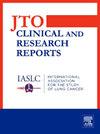Monotherapy With Immune Checkpoint Blockade Improves Survival Outcomes in KRAS-Mutant but Not KRAS Wild-Type Metastatic Lung Adenocarcinoma: Validation From an Extended Swedish Cohort
IF 3.5
Q2 ONCOLOGY
引用次数: 0
Abstract
Introduction
Immune checkpoint blockade (ICB) is a standard first-line treatment for stage IV NSCLC without actionable oncogenic alterations. KRAS mutations, prevalent in 30% to 40% lung adenocarcinomas (LUAD) in Western populations, currently lack targeted first-line therapies. This study aimed to assess the predictive value of KRAS mutations for clinical outcomes after distinct ICB regimens, validating our previous findings in a larger cohort with extended follow-up.
Methods
We conducted a retrospective multicenter study including consecutive stage IV LUAD patients (n = 424) treated with either ICB or platinum-doublet chemotherapy between 2016 and 2021 in Western Sweden. Patient demographics, tumor characteristics, treatment details, and survival outcomes were retrospectively collected from patient charts and the Swedish National Lung Cancer Registry. KRAS mutational status was assessed by next-generation sequencing. Primary end points included overall survival (OS) and progression-free survival (PFS), analyzed using Kaplan-Meier curves and multivariate Cox regression.
Results
Among 424 patients diagnosed with metastatic LUAD, 40% harbored KRAS mutations (KRASMUT). KRASMUT patients exhibited significant improvement in OS (16 versus 8 mo, p < 0.001) and PFS (8 mo versus 5 mo, p < 0.001) with ICB monotherapy. In contrast, KRAS wild-type (KRASWT) patients derived no survival advantage from ICB monotherapy (OS, 8 mo versus 8 mo, p = 0.648; PFS 4 mo versus 5 mo, p = 0.871) although they did so with chemoimmunotherapy (OS, 15 mo versus 8 mo, p = 0.032; PFS, 6 mo vs 5 mo, p = 0.033). On multivariate analysis, monotherapy was confirmed as an independent factor improving outcomes in KRAS-mutated patients (hazard ratio [HR] 0.533, 95% confidence interval 0.311-0.912, p = 0.018). Finally, we identified KRASG12C (OS: 13.7 mo versus 10.5 mo, p = 0.0046, PFS: 7.7 mo versus 6.2 mo, p = 0.002) and KRASG12V (OS: 24.2 mo versus 7.2 mo, p = 0.0204; PFS: 13.7 mo versus 4.5 mo, p = 0.063) but not KRASG12D (OS, 5.8 mo versus 6.2 mo, p = 0.777; PFS, 4.6 mo versus 3.2 mo, p = 0.694) as distinctly and independently predictive of improved survival after receiving ICB-containing treatment.
Conclusions
KRAS mutations predict substantial and sustained clinical benefit from first-line ICB monotherapy in metastatic LUAD, whereas KRAS wild-type patients do not. KRASG12C and KRASG12V mutations confer improved survival, whereas KRASG12D does not. Integrating KRAS mutation status into clinical practice could guide personalized treatment strategies, optimizing immunotherapy outcomes in stage IV LUAD.
免疫检查点阻断单药治疗可改善KRAS突变型而非KRAS野生型转移性肺腺癌的生存结局:来自瑞典扩展队列的验证
免疫检查点阻断(ICB)是IV期非小细胞肺癌的标准一线治疗方法,没有可操作的致癌改变。KRAS突变在西方人群中普遍存在于30%至40%的肺腺癌(LUAD)中,目前缺乏靶向一线治疗方法。本研究旨在评估不同ICB方案后KRAS突变对临床结果的预测价值,在更大的随访队列中验证我们之前的发现。方法:我们在瑞典西部进行了一项回顾性多中心研究,包括2016年至2021年间连续接受ICB或铂双药化疗的IV期LUAD患者(n = 424)。从患者图表和瑞典国家肺癌登记处回顾性收集患者人口统计资料、肿瘤特征、治疗细节和生存结果。通过下一代测序评估KRAS突变状态。主要终点包括总生存期(OS)和无进展生存期(PFS),使用Kaplan-Meier曲线和多变量Cox回归进行分析。结果在424例诊断为转移性LUAD的患者中,40%携带KRAS突变(KRASMUT)。KRASMUT患者在ICB单药治疗下的OS(16个月vs 8个月,p < 0.001)和PFS(8个月vs 5个月,p < 0.001)均有显著改善。相比之下,KRAS野生型(KRASWT)患者没有从ICB单药治疗中获得生存优势(OS, 8个月vs 8个月,p = 0.648; PFS 4个月vs 5个月,p = 0.871),尽管他们在化疗免疫治疗中获得了生存优势(OS, 15个月vs 8个月,p = 0.032; PFS, 6个月vs 5个月,p = 0.033)。多因素分析证实,单药治疗是改善kras突变患者预后的独立因素(风险比[HR] 0.533, 95%可信区间[0.311-0.912],p = 0.018)。最后,我们确定KRASG12C (OS: 13.7个月对10.5个月,p = 0.0046, PFS: 7.7个月对6.2个月,p = 0.002)和KRASG12V (OS: 24.2个月对7.2个月,p = 0.0204; PFS: 13.7个月对4.5个月,p = 0.063),但KRASG12D (OS, 5.8个月对6.2个月,p = 0.777; PFS, 4.6个月对3.2个月,p = 0.694)不能作为接受含icb治疗后生存率改善的明显和独立预测指标。结论:在转移性LUAD患者中,skras突变预示着一线ICB单药治疗可带来实质性和持续的临床获益,而KRAS野生型患者则不然。KRASG12C和KRASG12V突变可提高生存率,而KRASG12D则不能。将KRAS突变状态整合到临床实践中可以指导个性化治疗策略,优化IV期LUAD的免疫治疗效果。
本文章由计算机程序翻译,如有差异,请以英文原文为准。
求助全文
约1分钟内获得全文
求助全文
来源期刊

JTO Clinical and Research Reports
Medicine-Oncology
CiteScore
4.20
自引率
0.00%
发文量
145
审稿时长
19 weeks
 求助内容:
求助内容: 应助结果提醒方式:
应助结果提醒方式:


